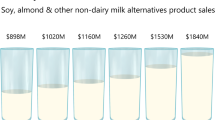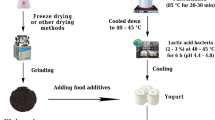Abstract
In the present study, influences of nine probiotics and tea polyphenols on the production of acetic, butyric, and lactic acid from simulated colonic fermentation of maize resistant starch (RS) were investigated. RS was fermented by fecal extracts of healthy adults at 12 g L−1 and 37 °C for 18–48 h in the presence and absence of exogenous probiotics and tea polyphenols. The added probiotics increased acetic and butyric acid production by 25–216 %. Eubacterium faecalis, Lactobacillus acidophilus, L. casei, and L. helveticus increased lactic acid production by 7–58 %; however, other probiotics decreased lactic acid production. Tea polyphenols facilitated lactic acid production but inhibited acetic and butyric acid production clearly. More importantly, the added probiotics weakened the inhibitory effects of tea polyphenols on the two acids, enhancing acetic and butyric acid production by 152–641 and 825–1,777 %, respectively. It is concluded that both probiotics and tea polyphenols have different impacts on the production of acetic, butyric and lactic acid during the colonic fermentation of RS. The impacts of other probiotics and food components on the colonic fermentation of RS and other dietary fibers should be investigated in future study to clarify their possible interactions.

Similar content being viewed by others
References
Abuajah CI, Ogbonna AC, Osuji CM (2014) Functional components and medicinal properties of food: A review. J Food Sci Technol. doi:10.1007/s13197-014-1396-5
Ahmed R, Segal I, Hassan H (2000) Fermentation of dietary starch in humans. Am J Gastroenterol 95:1017–1020
Ajila CM, Prasada Rao UJS (2013) Mango peel dietary fibre: Composition and associated bound phenolics. J Funct Food 5:444–450
Araya M, Morelli L, Reid G, Sanders M, Stanton C, Pineiro M, Ben Embarek P (2002) Guidelines for the evaluation of probiotics in food. Report of a Joint FAO/WHO working group on drafting guidelines for the evaluation of probiotics in food, London, Ontario, Canada
Ashraf R, Shah NP (2011) Selective and differential enumerations of Lactobacillus delbrueckii subsp. bulgaricus, Streptococcus thermophilus, Lactobacillus acidophilus, Lactobacillus casei and Bifidobacterium spp. in yoghurt-a review. Int J Food Microbiol 149:194–208
Atlas RM (2004) Handbook of Microbiological Media vol 1. CRC Press
Barker SB, Summerson WH (1941) The colorimetric determination of lactic acid in biological material. J Biol Chem 138:535–554
Bauer JL, Harbaum-Piayda B, Schwarz K (2012) Phenolic compounds from hydrolyzed and extracted fiber-rich by-products. LWT-Food Sci Technol 47:246–254
Bird AR, Brown IL, Topping DL (2006) Low and high amylose maize starches acetylated by a commercial or a laboratory process both deliver acetate to the large bowel of rats. Food Hydrocoll 20:1135–1140
Bourquin LD, Titgemeyer EC, Fahey GC Jr (1996) Fermentation of various dietary fiber sources by human fecal bacteria. Nutr Res 16:1119–1131
Bourriaud C, Robins RJ, Martin L, Kozlowski F, Tenailleau E, Cherbut C, Michel C (2005) Lactate is mainly fermented to butyrate by human intestinal microfloras but inter-individual variation is evident. J Appl Microbiol 99:201–212
Brites CM, Trigo MJ, Carrapico B, Alvina M, Bessa RJ (2011) Maize and resistant starch enriched breads reduce postprandial glycemic responses in rats. Nutr Res 31:302–308
Butel MJ (2014) Probiotics, gut microbiota and health. Med Mal Infect 44:1–8
Crittenden R, Karppinen S, Ojanen S, Tenkanen M, Fagerström R, Mättö J, Saarela M, Mattila-Sandholm T, Poutanen K (2002) In vitro fermentation of cereal dietary fibre carbohydrates by probiotic and intestinal bacteria. J Sci Food Agric 82:781–789
Devi PB, Vijayabharathi R, Sathyabama S, Malleshi NG, Priyadarisini VB (2014) Health benefits of finger millet (Eleusine coracana L.) polyphenols and dietary fiber: A review. J Food Sci Technol 51:1021–1040
Dona AC, Pages G, Gilbert RG, Kuchel PW (2010) Digestion of starch: In vivo and in vitro kinetic models used to characterise oligosaccharide or glucose release. Carbohydr Polym 80:599–617
Duncan SH, Louis P, Flint HJ (2004) Lactate-utilizing bacteria, isolated from human feces, that produce butyrate as a major fermentation product. Appl Environ Microbiol 70:5810–5817
Fenster K, Rankin S, Steele J (2003) Accumulation of short-chain ethyl esters by esterases of lactic acid bacteria under conditions simulating ripening parmesan cheese. J Dairy Sci 86:2818–2825
Fuentes-Zaragoza E, Riquelme-Navarrete MJ, Sánchez-Zapata E, Pérez-Álvarez JA (2010) Resistant starch as functional ingredient: A review. Food Res Int 43:931–942
Grun CH, van Dorsten FA, Jacobs DM, Le Belleguic M, van Velzen EJJ, Bingham MO, Janssen HG, van Duynhoven JPM (2008) GC-MS methods for metabolic profiling of microbial fermentation products of dietary polyphenols in human and in vitro intervention studies. J Chromatogr B 871:212–219
Jaquet M, Rochat I, Moulin J, Cavin C, Bibiloni R (2009) Impact of coffee consumption on the gut microbiota: A human volunteer study. Int J Food Microbiol 130:117–121
Jonathan MC, van den Borne JJGC, van Wiechen P, Souza da Silva C, Schols HA, Gruppen H (2012) In vitro fermentation of 12 dietary fibres by faecal inoculum from pigs and humans. Food Chem 133:889–897
Kanwar J, Mujtaba Taskeen IM, Huo CD, Chan TH, Dou QP (2012) Recent advances on tea polyphenols. Fronti Biosci 4:111–131
Kaplan H, Hutkins RW (2000) Fermentation of fructooligosaccharides by lactic acid bacteria and bifidobacteria. Appl Environ Microbiol 66:2682–2684
Lebet V, Arrigoni E, Amadò R (1998) Measurement of fermentation products and substrate disappearance during incubation of dietary fibre sources with human faecal flora. LWT-Food Sci Technol 31:473–479
Lee HC, Jenner AM, Low CS, Lee YK (2006) Effect of tea phenolics and their aromatic fecal bacterial metabolites on intestinal microbiota. Res Microbiol 157:876–884
Liu RP, Xu GF (2008) Effects of resistant starch on colonic preneoplastic aberrant crypt foci in rats. Food Chem Toxicol 46:2672–2679
Lopez HW, Levrat-Verny MA, Coudray C, Besson C, Krespine V, Messager A, Demigné C, Rémésy C (2001) Class 2 resistant starches lower plasma and liver lipids and improve mineral retention in rats. J Nutr 131:1283–1289
Morrison DJ, Mackay WG, Edwards CA, Preston T, Dodson B, Weaver LT (2006) Butyrate production from oligofructose fermentation by the human faecal flora: What is the contribution of extracellular acetate and lactate. Brit J Nutr 96:570–577
Parkar SG, Stevenson DE, Skinner MA (2008) The potential influence of fruit polyphenols on colonic microflora and human gut health. Int J Food Microbiol 124:295–298
Purwani EY, Purwadaria T, Suhartono MT (2012) Fermentation RS3 derived from sago and rice starch with Clostridium butyricum BCC B2571 or Eubacterium rectale DSM 17629. Anaerobe 18:55–61
Rodríguez-Cabezas ME, Camuesco D, Arribas B, Garrido-Mesa N, Comalada M, Bailón E, Cueto-Sola M, Utrilla P, Guerra-Hernández E, Pérez-Roca C, Gálvez J, Zarzuelo A (2010) The combination of fructooligosaccharides and resistant starch shows prebiotic additive effects in rats. Clin Nutr 29:832–839
Scharlau D, Borowicki A, Habermann N, Hofmann T, Klenow S, Miene C, Munjal U, Stein K, Glei M (2009) Mechanisms of primary cancer prevention by butyrate and other products formed during gut flora-mediated fermentation of dietary fibre. Mutat Res 682:39–53
Siew-Wai L, Zi-Ni T, Karim AA, Hani NM, Rosma A (2010) Fermentation of metroxylon sagu resistant starch type III by Lactobacillus sp. and Bifidobacterium bifidum. J Agric Food Chem 58:2274–2278
Souza da Silva C, Bolhuis JE, Gerrits WJ, Kemp B, van den Borne JJ (2013) Effects of dietary fibers with different fermentation characteristics on feeding motivation in adult female pigs. Physiol Behav 110:148–157
Sreenivas KM, Lele SS (2013) Prebiotic activity of gourd family vegetable fibres using in vitro fermentation. Food Biosci 1:26–30
Stewart ML, Timm DA, Slavin JL (2008) Fructooligosaccharides exhibit more rapid fermentation than long-chain inulin in an in vitro fermentation system. Nutr Res 28:329–334
Vijayalaxmi S, Jayalakshmi S, Sreeramulu K (2014) Polyphenols from different agricultural residues: Extraction, identification and their antioxidant properties. J Food Sci Technol. doi:10.1007/s13197-014-1295-9
Wang ZJ, Ohnaka K, Morita M, Toyomura K, Kono S, Ueki T, Tanaka M, Kakeji Y, Maehara Y, Okamura T, Ikejiri K, Futami K, Maekawa T, Yasunami Y, Takenaka K, Ichimiya H, Terasaka R (2013) Dietary polyphenols and colorectal cancer risk: The Fukuoka colorectal cancer study. World J Gastroenterol 19:2683–2690
Williams BA, Mikkelsen D, le Paih L, Gidley MJ (2011) In vitro fermentation kinetics and end-products of cereal arabinoxylans and (1,3;1,4)-β-glucans by porcine faeces. J Cereal Sci 53:53–58
Yang JY, Martinez I, Walter J, Keshavarzian A, Rose DJ (2013) In vitro characterization of the impact of selected dietary fibers on fecal microbiota composition and short chain fatty acid production. Anaerobe 23:74–81
Zhao XH, Lin Y (2009) Resistant starch prepared from high-amylose maize starch with citric acid hydrolysis and its simulated fermentation in vitro. Eur Food Res Technol 228:1015–1021
Zhao XH, Zhu CL (2013) Synergic effect of exogenous microorganism combination on propionic and butyric acid formation during in vitro colonic fermentation of maize resistant starch. Starch-Starke 65:660–665
Zhou ZK, Cao XH, Zhou JY (2013) Effect of resistant starch structure on short-chain fatty acids production by human gut microbiota fermentation in vitro. Starch-Starke 65:509–516
Zhu CL, Zhao XH (2013) In vitro fermentation of a retrograded maize starch by healthy adult fecal extract and impacts of exogenous microorganisms on three acids production. Starch-Starke 65:330–337
Acknowledgments
This study was financially supported by the Specialized Research Fund for the Doctoral Program of Higher Education of China (Project No. 20092325110012). The authors also thank the anonymous reviewers and editors for their valuable advice.
Author information
Authors and Affiliations
Corresponding author
Rights and permissions
About this article
Cite this article
Geng, Q., Zhao, XH. Influences of exogenous probiotics and tea polyphenols on the production of three acids during the simulated colonic fermentation of maize resistant starch. J Food Sci Technol 52, 5874–5881 (2015). https://doi.org/10.1007/s13197-014-1662-6
Revised:
Accepted:
Published:
Issue Date:
DOI: https://doi.org/10.1007/s13197-014-1662-6




